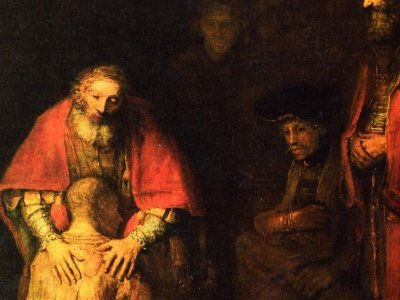
THE PARABLE OF THE OLDER BROTHER
It is striking how many people identify with the older brother in the Parable of the Prodigal Son (Luke chapter 15), rather than with the wayward son. It is an archetype of family life and like the best stories, there is this stimulating subplot, too. For those who identify with subplots, it is really the Parable of the Older Brother. If you feel that’s you, then this article is for you, too. And if it is, the chances are you are in some form of full-time Christian ministry, because church leadership is full of ‘older brothers’.
The older brother is still working when the prodigal, younger brother is hugged by his adoring, weeping father. When he clocks off work, tired and with little energy left to enjoy the day, the party is in full swing. All the anger he feels towards his brother, formed not just of his selfishness and recklessness but also of the pain his disappearance caused the whole family, and probably countless other microaggressions over the years, comes to a boil. Like all parents wanting harmony between their children, the father is desperate to assuage his older son before the two sons come to blows and the festivities are ruined.
And then the older brother issues these timeless words:
All these years I have been working like a slave for you
It is possible he uttered these words simply to hurt his father: that he had failed as a father because the son had always felt taken for granted. But it may also have been the realisation of what he had become; what his brother’s return brought to light. Slaves are sold in an instant, but the older brother had slipped slowly by choice into self-appointed slavery. He worked excessive hours, denied himself pleasures, restricted his movements – the opposite of his brother.
Many people who work for the Lord, in full-time or heavy voluntary capacities, seem especially to identify with the older brother. They have a deep sense of duty, a high work ethic and a capacity to keep going. But there are incipient risks: God becomes confined to the jobs performed for God. When the job is complete, God becomes redundant. Work substitutes for relationship; joy is punctured.
What kind of relationship did the older brother have with his father? The older brother had grown apart from his father and completely misjudged him. The Father knew that all he owned belonged as much to his son, who was free to make the most of it. But the son had stopped talking to the father about things other than work. He became resentful and self-pitying in his labour and divorced from its fruits. He waited for the father to do special things, not seeing his birthright delivered these as of right. Instead he simmered with passive aggression, waiting for the father to do something nice, and staying quiet when nothing happened rather than speaking frankly about his disappointment.
This is a particular danger posed to those who labour faithfully for God year after year. Some carry on, but their heart is no longer in it in the same way; brooding over perceived slights, they fail to see their own light dimming. Duty completely envelopes joy.
Jesus needn’t have added this secondary plot to the psychodrama but in doing so, he is asking some of us to re-appraise our lives. Only in our resentful imagination are we slaves; in reality, we are children who will not only inherit in time, but can enjoy the rich things of belonging to God’s family now.
The narrative is usually that the younger son rebelled against his father. But what if he didn’t? What if he rebelled instead against his uptight and repressed older brother who set him such a joyless example that he had to get away? People notice how we live for Jesus. And it can influence whether they run to the father – or away from him.
POPULAR ARTICLES

Obama's Covert Wars
The use of drones is going to change warfare out of all recognition in the next decades.

Through A Glass Starkly
Images of traumatic incidents caught on mobile phone can be put to remarkable effect.

What Are British Values?
Is there a British identity and if so, what has shaped the values and institutions that form it?


